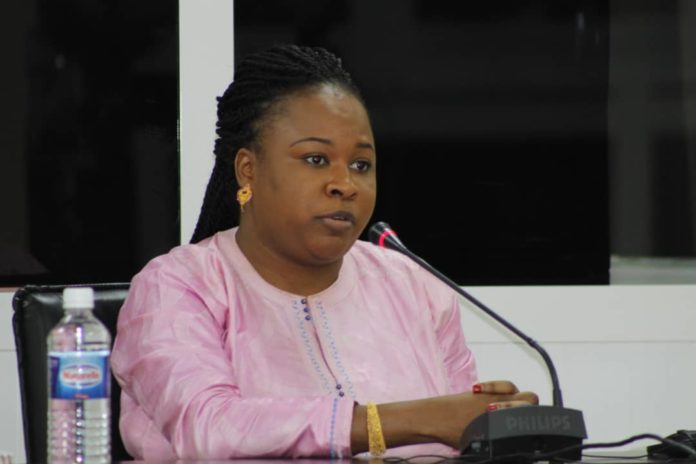By Yankuba Jallow
Ndey Tapha-Sosseh, a one-time President of The Gambia Press Union (GPU) has alleged that the Gambia Government has made several times attempts to secure her extradition to the Gambia, but these moves were refused by the Malian Government.
The 40 – year – old veteran journalist was in exile after countering a statement that ex-President Yahya Jammeh made in an interview with the GRTS regarding the uninvestigated murder of late Dayda Hydara. Hydara was gunned down by unknown people sometime in 2004 and since then, the Government of The Gambia has never made any serious investigation on his untimely demise.
In June 2009, Madam Sosseh went into exile until around October 2017 when she returned to The Gambia.
Testifying before the Truth, Reconciliation and Reparations Commission (TRRC) on Thursday, she indicated that she spent her entire 9 –year stay in exile in the Malian capital –Bamako.
She said the former government applied and used all mechanisms to extradite her but failed. She explained that while on a trip, she was detained at Zimbabwe airport on the request by the Government of The Gambia for hours before a swift intervention by the Malian authorities paid dividend for her release.
She said in 2011, Momodou Tangara, the Minister of Foreign Affairs held several meetings with Malian authorities to deport her.
“The foreign (affairs) minister, Momodou Tangara met the Malian foreign minister first in Kampala and told them that President Jammeh was not happy at all because they were giving me the platform to destabilize The Gambia. He did not stop at that but held another conversation with the Malian minister of foreign affairs and he personally came to Mali and told them that the President wanted me extradited; that I was involved in activities to destabilize The Gambia. Technically, I was involved in a coup,” she said.
She said the Malian authorities requested from the Government of The Gambia to provide proof of their claims of her involvement in the purported coup. She said the Gambia government did not provide any proof to their claims. She added that the Malian authorities would always advise her to lie low as far as her activities about The Gambia are concerned. She said the Malians advised her to be more cautious of her personal safety because Jammeh was very dangerous and could have elements in Mali who could track her. She explained that the International Federation of Journalists paid for private security who were providing her 24 – hours security.
“The Malian government supported me so much and refused the request of the Gambia Government to extradite her,” she said.
She said her mother’s house was ransacked twice by agents of the Government of the Gambia though nothing was taken away on both occasions.
She said despite her stay in exile, she has always been actively engaging in activities to ensure a peaceful change of government. She was a member of the Coalition for Change, that printed T-shirts calling for an end to dictatorship. She said Dr. Amadou Scattred Janneh along with others were arrested and prosecuted on several criminal counts including treason. She added that Janneh was convicted and sentenced to life imprisonment. She told the Commission that even though Dr. Janneh was serving his jail term, she used to communicate to him while in Mile II. She said she was able to get information regardingthe execution of 9 inmates in Mile II by the former government through Dr. Janneh who provided her details of those executed.
She said she is also a member of the Civil Society Association – The Gambia. She said this association was formed after the arrest of Dr. Janneh to unite civil society groups in The Gambia in order to strengthen their advocacy role.
She explained how the Gambia government denied her passport after her previous one expired. She said while in exile, she used Malian passport which she obtained through citizenship by marriage.
In her concluding remarks, she underscored the importance of freedom of information and expression adding that it ensures people to make informed decisions. She put forward an argument that freedom of information and freedom of expression are not only for the media but for the general public at large. She said these two freedoms make governments know what the people need and enable decision makers know what is needed. She added that it leads to tolerance.
“Patriotism and tolerance are very key in your ‘never again’ campaign,” she concluded.


















